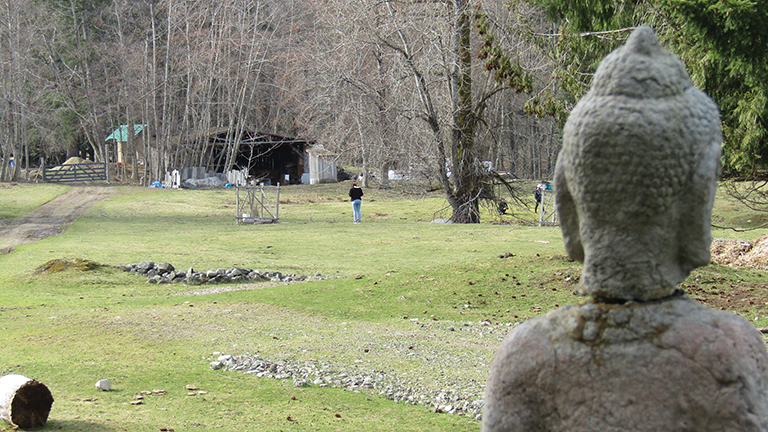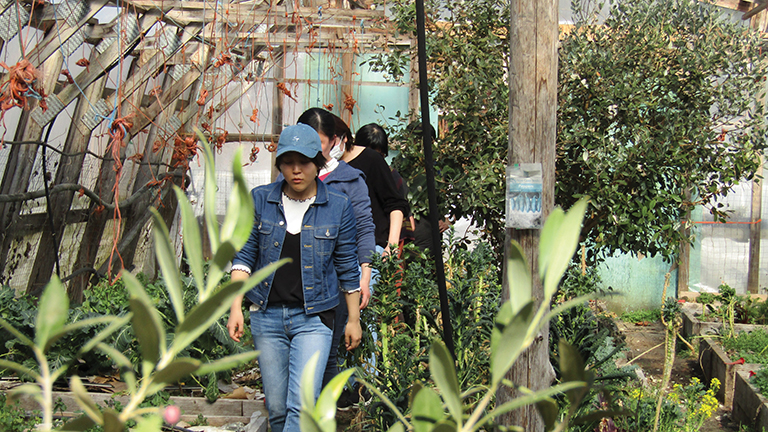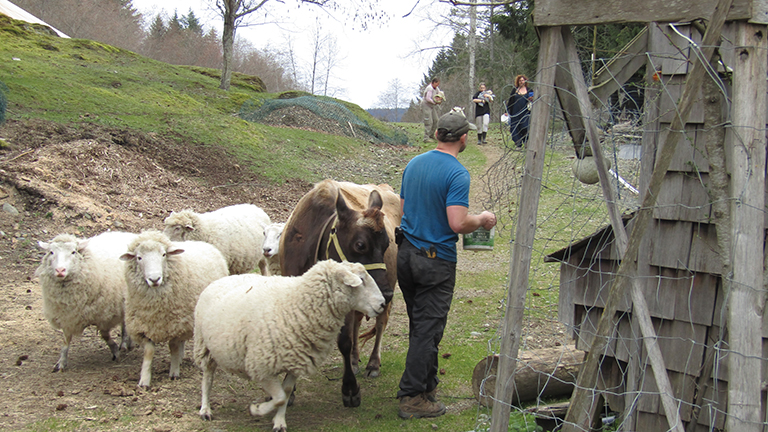Excerpted from the Fall 2019 edition of Communities, “The Shadow Side of Cooperation”—full issue available for download (by voluntary donation) here.

Lately, as the volunteer coordinator at OUR Ecovillage (Shawnigan Lake, British Columbia), I have been telling new volunteers that I’ve noticed that “often people who come here come to learn about community and permaculture, but what they really end up learning about is themselves.”
As someone who first stepped onto this land almost two years ago, I have gone through this process personally. I came here initially to learn how to “grow my own food,” but eventually that morphed into so much more. As a travelling yoga and meditation teacher, I realized that my journey had been quite isolated for the past couple of years. I felt ungrounded. I could tell my next growth edge was learning about relationship, community, and putting everything that I learned from my spiritual practices and studies into real life experience.
Once I arrived, it took some time to really “land” into the experience of living in a community. I had to get used to being around people most of the day, working in teams, as well as learn the skills needed to live in a rural environment and on the land. I had to reassess what my true “needs” were as the distractions of living in the city were no longer there. And after a period of going through my own intense transformational process, my own shadows revealed themselves. I found out how I got triggered, I discovered more about my own personality, and I had vivid dreams bringing me messages on stuff deep in my unconscious which I needed to work on. It was uncomfortable, at first, as I learned how to manage my introversion within a community environment and I had to give up some of my privacy.
I also witnessed a similar pattern with others who arrive here fresh from their city life, looking to find their tribe and understand what community is all about. People come here to learn something in particular, but the personal process they go through to get there often takes them on a long, windy, internal journey. Living in a community not only demands that you do outer work to keep the community alive but even more so a profound amount of inner work is required. Whether or not someone is brave enough to face this process is where we find out who really is committed to this experience of living in a community.
I’ve noticed a couple of “warning signs” indicating types of people who will have a difficult time living in our community:

1. People who arrive with extensive fantasies and idealizations about how “living in an ecovillage” will be the solution to all their real-life problems.
I’ve noticed that a lot of people come here with the idea that living at an ecovillage will somehow be the solution to everything in their lives. It’s a widespread millennial fantasy to want to give up your “matrix” job, buy some land, and learn how to grow your own organic food. They often come with an overly positive attitude (which is not always a bad thing to be around) and a serious vision of the world they want to live in. I’ve realized that this is a tricky thing to spot as a shadow projection, but in fact it is the lesser understood “positive shadow projection,” where we project onto the world and the people around us an idealized image on how it should be rather than being able to see the truth of what is there.
People who come with these starry eyes often end up disappointed when the experience of living in this community is much more practical and gritty than what they imagined. Instead of doing yoga all day and harvesting magically growing perfect vegetables that land right onto their plate, there’s lots of work that needs to be done to make this vision a reality, and working and living in a group of people which you are around 24/7 isn’t the easiest for people who value “privacy.” When reality doesn’t match up with their projections, I have noticed a pattern in people like this where they get upset that the community didn’t match up to their fantasy, and launch into criticism on “what needs to change” for them to be more “comfortable.” These are often deep processes where they struggle with everyone in the community to try to make sense of their discomfort when the reality is that they are uncomfortable with this new situation and not allowing themselves to recognize that.
Often, these situations go out with a bang like an overblown romantic honeymoon that suddenly ends when two people realize that they married the wrong person. Sometimes, there are more simple transitions, where the person bids goodbye and then moves onto the “next thing,” placing their idealizations on the subsequent idea they have, a new place they feel will be the paradise they are seeking. Sometimes, these people end up back here when they realize no such place exists.
This, I feel, is indicative of a larger societal pattern that we all engage in to a certain extent. Most people, when they get uncomfortable, tend to blame the world for their experience rather than go through the inner process so that they can manage whatever emotions are arising and make sense of them. And many of us expect the world and the people around us to fit into our vision of how we want the world and people to be, rather than just seeing them as they are. Not only that, we all must recognize our active part in not only managing our internal perceptions and emotions but also realizing that we must create these inner changes before we bring outer changes to the world, to ensure we are doing it from a space of integrity and love.
Another warning sign of a poor match with community living:
2. People who are not capable of taking self-responsibility for how they feel and their actions.
When I look for people to propose that we take onto our team, I look for emotional intelligence as well as practical skills which are necessary to navigate the difficult situations that can come up in the community from time to time. The more a person is able to see things outside of the lens of their own experience and consider things in the greater context, while also taking responsibility for their own personal part in it, the greater they can build up the collective.
There is a day-to-day process of self-inquiry and shadow work necessary to have a team who lives and works together harmoniously. If a person speaks to us in a certain way that we find upsetting, it is important to have the humility to reflect on our own emotional triggers that came up rather than moving right into “blame.” Yes, someone can speak to us in hostility, and sometimes it’s right to create proper boundaries…but an interesting thing to note (which I learned from a meditation teacher I work with) is that the body actually doesn’t know boundaries. It will experience the energy, the action, the words of the people in its environment as part of its own direct experience and especially when we live and work together. So if someone is having a bad day, or wants to project their stuff on others, it will affect people around them.
When living in community, these boundaries are even more open considering the fact we are living and working together. Therefore, especially in community, it’s important to be able to recognize that we need to take responsibility for our reactions and actions to those around us as a part of developing the inner strength to not take on what isn’t ours, and not take personally what may just be someone else’s bad day.

● ● ●
I think the important thing to note is that “there are no perfect situations.” A lot of people fantasize about leaving their busy urban lives and becoming self-sustainable by learning to grow their own food, but have no experience or idea of the amount of labour involved in farming, the time and work it takes to do this.
I think the important thing to note is that “there are no perfect situations.” A lot of people fantasize about leaving their busy urban lives and becoming self-sustainable by learning to grow their own food, but have no experience or idea of the amount of labour involved in farming, the time and work it takes to do this.
And it’s important to approach any intentional community with curiosity, no expectations or fantasies, so we can allow the reality of “what it is” to emerge through our own direct experiences. We must be able to see that it’s not just about growing food or living in community, but that the relationship we have with others BEGINS with the relationship we have with ourselves.
And rather than denying that these more difficult aspects in community exist, we need to approach them with softness, curiosity, and vulnerability. We surely live in challenging times and a lot will come up internally and externally as we heal our collective wound in how we relate to ourselves and the planet. But the more friendliness we have towards these more difficult parts of ourselves, and difficult parts of living in community, the easier it will be to make this journey together.
Laura Matsue is a certified Holistic Life Coach and Meditation Teacher and RYT (Registered Yoga Teacher). She currently lives with her partner in Los Angeles, where she has a private practice and hosts retreats. At the time of writing this article, she was living at OUR Ecovillage in Canada and regarded it as a life-changing and valuable experience. For more information visit www.ourecovillage.org and for more writing by Laura visit www.lauramatsue.com.
Excerpted from the Fall 2019 edition of Communities, “The Shadow Side of Cooperation”—full issue available for download (by voluntary donation) here.












